Bathing the Red Chairman: The story of Mao Zedong's record-breaking swim
Categories: Celebrities | History | World
By Pictolic https://pictolic.com/article/bathing-the-red-chairman-the-story-of-mao-zedongs-record-breaking-swim.htmlThe story of how the Great Helmsman in his eighth decade struggled with nature.
The creator of Communist China, Mao Zedong, is an ambiguous person, to put it mildly. The Chinese themselves evaluate the Chairman's board according to the formula put forward by him once: "Seven fingers are healthy, three fingers are sick."
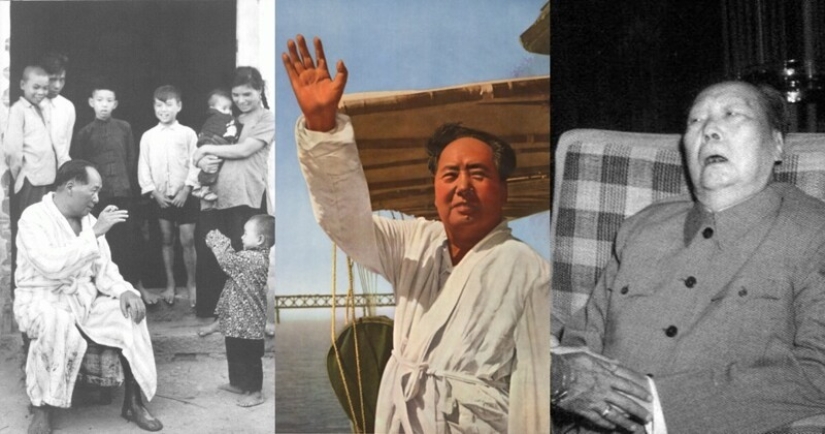 Almost immediately after his death, it was officially recognized that millions of human victims of the Great Leap Forward and the Cultural Revolution, the cult of personality are sick fingers, and the unification of the country, the creation of a modern Chinese state are healthy seven fingers. In China, you can even scold the Great Helmsman without much fanaticism, but the Chinese do not refuse his victories and his tyranny — history is history. No one thinks of removing the Chairman's mummy from Tiananmen Square or removing Mao's portrait from the Gates of Heavenly Tranquility.
Almost immediately after his death, it was officially recognized that millions of human victims of the Great Leap Forward and the Cultural Revolution, the cult of personality are sick fingers, and the unification of the country, the creation of a modern Chinese state are healthy seven fingers. In China, you can even scold the Great Helmsman without much fanaticism, but the Chinese do not refuse his victories and his tyranny — history is history. No one thinks of removing the Chairman's mummy from Tiananmen Square or removing Mao's portrait from the Gates of Heavenly Tranquility.
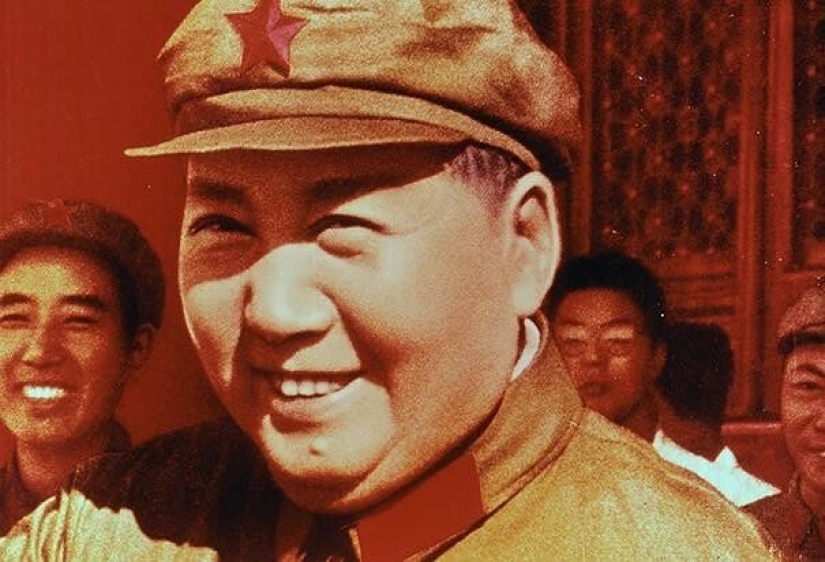
Mao's "sore fingers", for example, include his knowledge of economics. He wasn't shy about admitting that he didn't know a damn thing about economics, but he didn't want to listen to specialists at the same time. So there was a Big leap when Mao suddenly realized how to overtake capitalist countries in steelmaking: it is possible to install open-hearth furnaces in every yard so that people carry scrap iron in them after work.
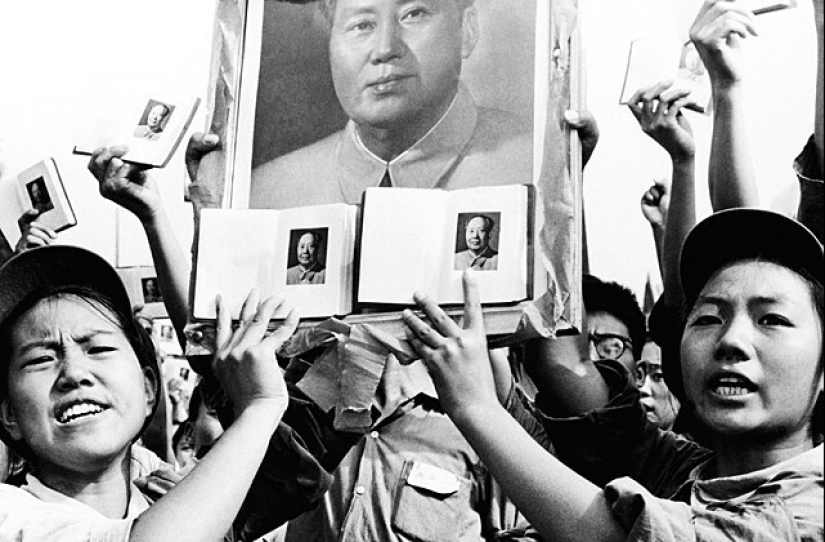
He was glad that he thought of it faster than the Americans and the British, but Mao's economic initiative completely failed — home-made steel was no good. Mao did not know how to admit mistakes and often, after failures and failures, he ran to some cave, a distant residence, could suddenly go with an inspection to a remote area or arrange a big swim, putting the problems that appeared on the shoulders of his ministers.
If the Chairman's subordinates, Confucius forbid, raked the firewood he had broken not in accordance with the party line, then Mao was returning from self-imposed exile and doing what he did best: destroying political rivals.
After the failed policy of the Big Leap, Mao retired from business, and while he was gone, Liu Shaoqi (later nicknamed "Chinese Khrushchev" by propaganda - the most offensive curse word for Mao) and Deng Xiaoping (thanks to his reforms, China will become an economic giant) conceived reforms to bring the country out of the crisis into which the Zedong leap drove it.
The chairman returned and, at the suggestion of his wife, a former actress who became Minister of Culture, Jiang Qing (she called herself "Chairman Mao's dog") gave the order to hit the headquarters. While the Red Guards were raging in the capital, humiliating yesterday's associates of the Great Helmsman at rallies, Mao decided to show the whole country and the whole world that at the age of 73 he is in the prime of not only political, but also physical strength.
In order to frighten political enemies and show his capabilities to the world, Mao decided to swim across the great Yangtze River of China. Mao was indeed a strong old man, despite the fact that he led a very unhealthy lifestyle. He smoked a lot, slept until lunch, and worked at night, his favorite dish was fried fatty pork with hot pepper. And in his old age, he was not going to give up these bad habits.
In addition, Mao did not brush his teeth (he thought it was enough to rinse his mouth with green tea). At the same time, he never went to the dentist, which is why he paid with all his upper teeth in the eighth decade. Mao, like Stalin, was very skeptical of doctors and preferred to be treated with folk remedies.
The Great Pilot was sure that frequent sex strengthens health and prolongs life. Mao had four wives and countless mistresses. There were incredible legends about his sexual adventures. Even when Mao was already an infirm, half-blind, half-deaf and practically mute old man, there were always young secretaries next to him, one of whom translated his unintelligible and quiet fragments of words to visitors.
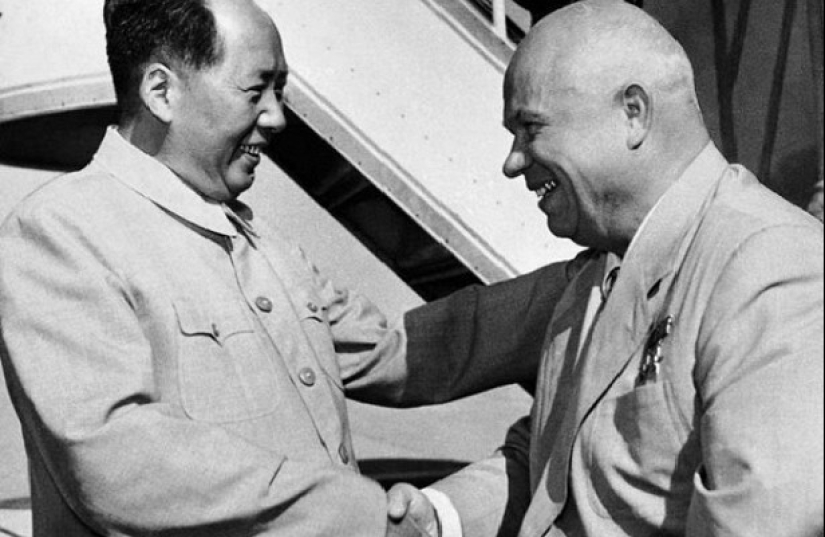
In short, Mao loved swimming. Mao first swam across the Yangtze in 1956. Then, to demonstrate his strength, he decided to swim across three great Chinese rivers: the Pearl River, Xiangjiang and Yangtze. The security service timidly tried to dissuade Mao, but he firmly decided to swim. Most of all, the guards were worried about water snakes (one snake bit a guard during Mao's swim on the Pearl River), as well as very, very dirty water.
The head of the security service , Mao , recalled the first swim on the Yangtze River:
Together with Mao, 20 guards and a boat sailed. Mao called swimming a battle with nature, from the waters of the Yangtze in the eyes of the Chinese, he emerged an unequivocal winner. But this swim was not only a PR stunt.
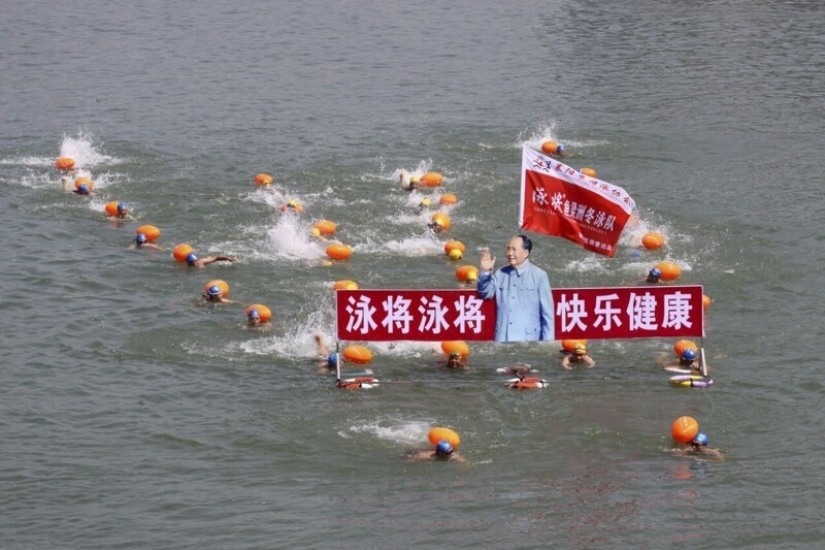
Mao made swimming the most popular sport in China. The newspapers wrote:
Mass swim on the Yangtze River from Wuhan (the one) together with the portrait of the Chairman has become an annual tradition. So Mao Zedong's love of swimming had a positive effect on the health of the nation.
In China, similar swims are still held every year, and in Wuhan has a Mao Zedong Swimming Museum.
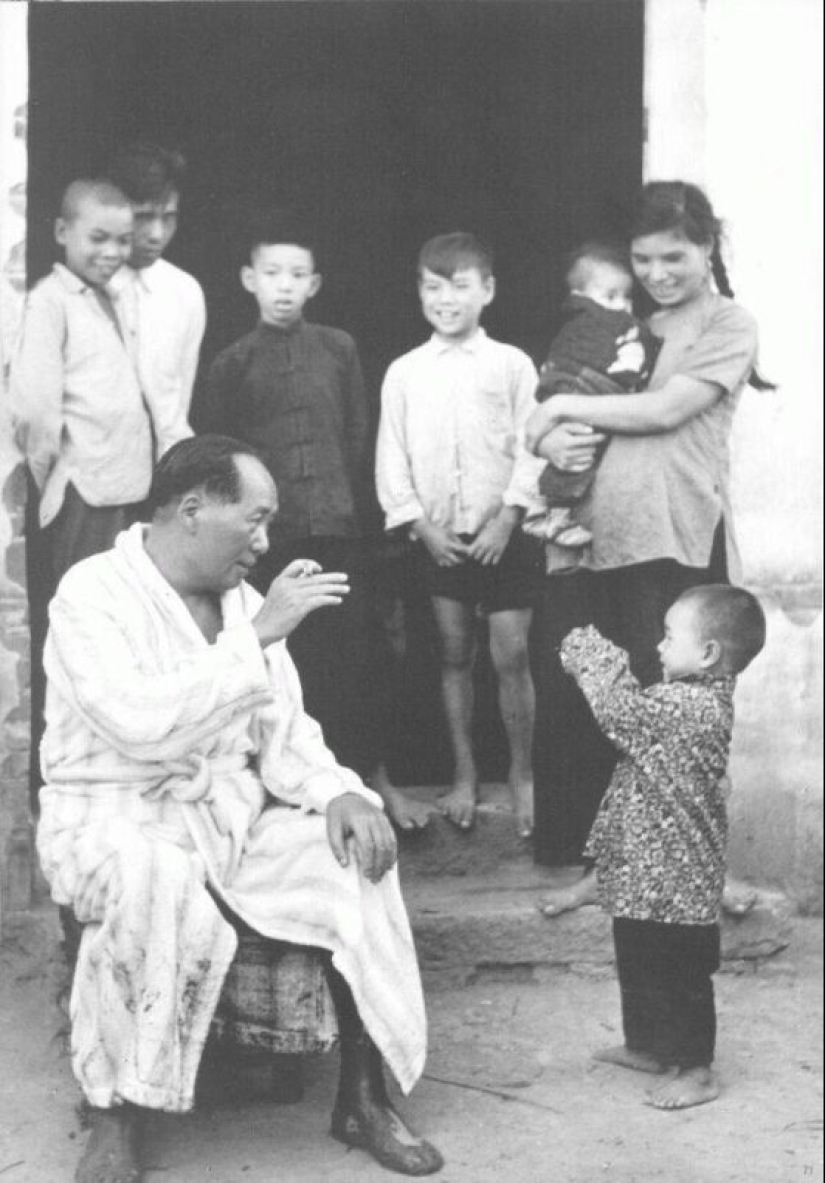
Just swam across the Yangtze and already with a cigarette
In July 1966, Mao swam across the Yangtze for the last time - according to Chinese propaganda, in total, the Chairman crossed the great River by swimming 17 times (in some Chinese sources, the number of Chairman's swims reaches forty-eight!).
On a hot summer day, when "the waters of the Yangtze seemed to smile at the Chairman," as the newspapers wrote, Mao swam 15 km along the river in 65 minutes (according to other sources, in 1 hour and 50 minutes) and cheerfully went ashore, where cheering crowds of Chinese were waiting for him. The next day, all the Chinese newspapers were praising Mao Zedong's endurance and strength at the break.
On all the front pages of all the newspapers, Mao had just come out of the water, all the articles about the swim noted that the Chairman was not a bit tired.
If the Chinese are used to the endless exploits of the Great Helmsman, then in the West they were surprised by the abilities of the Chairman. Mao swam 15 km in 65 minutes, which means that he swam at a speed of 3.8 m/s. It is known that Mao swam on his back.
Mitch Larkin from Australia swims the fastest of all modern athletes on his back. In 2015, he set a world record: he overcame 200 m in 106 seconds. It turns out that he was swimming at a speed of 1.88 m / s, which is half the speed of Mao. Moreover, Larkin could not maintain such a speed for all 15 km. From this it can be concluded that in 1966, at 72, Mao could easily have won Olympic gold.
American swimmers even sent a comic letter to Mao Zedong, in which they persuaded him to leave the post of chairman and earn money by participating in international competitions. One Taiwanese newspaper calculated that even if we take into account the speed of the current, and Mao went with the flow, his result still seems incredible.
In short, the West laughed and did not believe that Mao even crossed the Yangtze. In China, in August 1966, they even released a documentary about the historic swim to prove to the capitalists the reality of Mao's struggle with nature. Mao's biographers believe that there was a swim, but Mao was helped not only by the current, but also by the boat on some sections of the way.
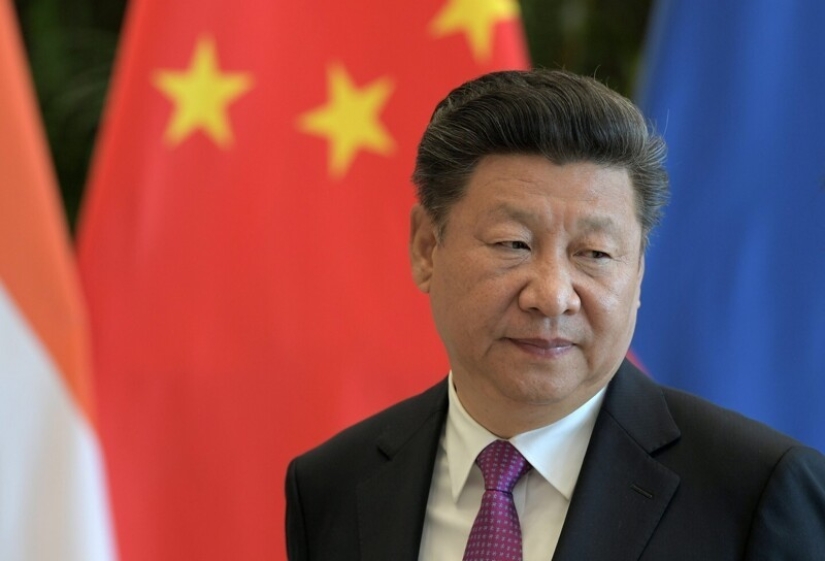
By the way, Xi Jinping also likes to swim, and at a meeting with Obama, he said that he swims 1 km every morning. However, the translator made a reservation and said that President Xi swims 10 km every morning, thus continuing the legend about the great water exploits of the Chinese rulers.
The 1966 swim produced the desired effect for Mao and, coming out of the water full of strength, he went to smash his opponents in Beijing. By the end of the 1960s, Mao's health began to deteriorate dramatically. In the early 1970s, Mao could barely walk and barely move his lips, only his closest assistant/mistress Zhang Yufeng could make out his speech.
Conversations with distinguished guests were already conducted by Zhou Enlai and Deng Xiaoping, and Mao was only brought to them for a couple of minutes as a living symbol of China. Mao Zedong was diagnosed with amyotrophic lateral sclerosis (it's like Stephen Hawking) and Parkinson's disease, in the last months of his life he just lay on one side on the couch and watched Hong Kong action movies with one eye.
Shortly before Mao's death, a major Tangshan earthquake occurred, which claimed hundreds of thousands of lives. It was as if nature reminded Mao before his death that she could not be defeated, and with a strong push, on the way to Beijing having lost almost all its power, Mao was thrown off his sofa.
The Chairman died on September 9, 1976 from a heart attack. Contrary to the last will of Mao Zedong, his embalmed body was put up in the mausoleum on Tiananmen Square, where it remains to this day.
Keywords: Swimming | China | Leader | River
Post News ArticleRecent articles

Among the historical sources from which scientists draw knowledge about Russia of the past centuries, there are notes of foreigners ...

The dream of most Russian actors is to star in Hollywood and stay there for a long time. The modern generation is gradually ...
Related articles

China's population was approaching one billion people when the government introduced the "one family, one child" policy. This was ...

The country, which is home to more than 1.5 billion people, sooner or later had to face a disposal problem, because the places in ...

One of the greatest cities in the world was captured on color film by American photographer Dmitry Kessel in 1947. For a city with ...

In the south of the island of Oahu, a dozen kilometers from Waikiki in the flooded crater of the volcano, the best beach for ...